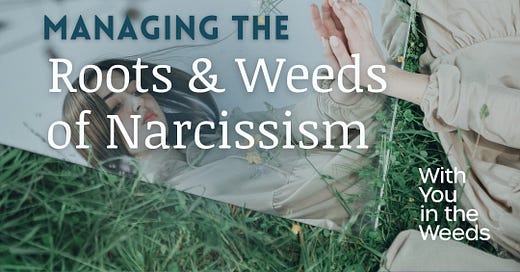In the first two episodes of our Managing Difficult People series, we featured special guest Erwin Lutzer, author, Bible teacher, and pastor of Moody Church in Chicago for 36 years. Pastor Lutzer has authored over 50 books including “Why Good People Do Bad Things” and “The Power of a Clear Conscience”. His preaching is heard around the world through his radio program, “Running to Win”. He’s also Lynn’s dad!
In these two of our most popular episodes, Lynn and Pastor Lutzer sat down together to talk about narcissism – what it is and how to spot it.
The Roots of Narcissism
Listen now: The Roots of Narcissism – Series 3, Episode 1
As we begin, let’s look at a few verses that will guide our treatment of this issue. Philippians 1:9-11 says, “And this I pray, that your love may abound still more and more in real knowledge and all discernment, so that you may approve the things that are excellent, in order to be sincere and blameless until the day of Christ.” We want to approach this issue with humility and compassion, and we pray for spiritual, emotional and psychological knowledge and discernment to do this.
To understand narcissism we will go back to the beginning of the Bible, particularly what happened in the Garden of Eden. The biblical narrative is so helpful in shaping our understanding of the human heart. When Adam and Eve sinned in the garden, all things that are beautiful and whole became fragmented on 3 relational levels:
Our relationship with God
Our relationship with others
Our relationship with ourselves
When someone’s sense of self becomes fragmented, this is called “splitting”. Psychologically speaking, the “bad” parts, like negative feelings and painful unmet emotional needs, are cut off, so that the “good” parts, like positive feelings and healthy qualities of the self, are the only thing that others are allowed to see. This splitting is the root of a narcissistic personality.
The narcissists’ inability to tolerate negative feeling or beliefs about themselves turns into self-absorption and their grandiosity masks the fact that there is very little true sense of self deep within; they try and fill this emptiness with constant projects, exciting new relationships, an impossible frenetic pace, and the pursuit of unrealistic fantasies. This “splitting” allows the narcissist to wear many different masks, and behave in ways are self-serving and manipulative within relationships.
The Five Behaviors of a Narcissist
1. Decide on a target and declare love – Also called “love bombing”, this is where they show copious amounts of love and affection, and make the person they have targeted feel special and singled out.
2. Devalue the person - This is where they become critical of the other person. Maybe subtly at first, but increasingly so over time. Nothing the other person does is right.
3. Deploy defense mechanisms - If the other person tries to confront them, this is when the narcissist brings defense mechanisms into play, like denial, projection, rationalization, and scapegoating.
4. Dissonance and confusion – The narcissist gaslights their partner by making them doubt reality. They may threaten abandonment and cut their partner off from family and friends as well as financial support.
5. Destroy the person’s sense of self – The annihilation of another person’s God-given identity through emotional abuse that happens behind closed doors. It is extremely damaging and wreaks havoc in relationships, in families, in churches, and in marriages.
If you have suffered at the hands of a narcissist, healing may seem to be an impossible task. However, God, who knows and sees even things done in secret, can bring healing when we are open and honest before him. When we ask God as the Psalmist did in Psalm 25 to “lead me into Thy truth and teach me”, we will be able to see through the confusion and manipulation and see people as they really are, not just who we want them to be.
In our second episode on this topic, we outline four steps to use in dealing with narcissists, and how to heal from narcissistic abuse.
Managing the Weeds of Narcissism
Listen now: Managing the Weeds of Narcissism – Series 3, Episode 2
We can go to the Bible to see a vivid example of narcissism. Saul was anointed by God to be king of Israel. He was tall, handsome, and won military victories. He appeared to be humble – at least, at first. However, when David appeared on the scene, Saul was consumed with jealousy, and became a spear-thrower – literally throwing spears at David. We see that Saul’s leadership qualities became his Achilles heel because he didn’t have the character to support his gifting.
People who cannot handle competition, need to be in the spotlight, and see everything through their “narcissistic lens” may also be spear-throwers, although their “spears” may take the form of emotional, verbal, spiritual, financial, and/or physical abuse. Sadly, it’s not uncommon to see narcissists in church settings. What better place to exercise authority and manipulate others than in a place where people are looking for leadership and are very impressionable? In fact, there may be no more dangerous combination than a religious narcissist who is well-versed in Scripture and can use it to control others.
Being a Christian or knowing the Bible doesn’t undo this type of psychological brokenness. Outwardly someone may portray a sense of morality, but this is just one of the masks that the narcissist has learned to wear. Time is what eventually exposes the truth about this person and their true nature comes into the light.
Four Steps to Dealing with Narcissists
1. Discernment – You need to be willing to accept reality. This itself can be healing. “It’s not me! I’m not crazy!” You need to have discernment because the enemy employs these tactics of manipulation to deceive and pull us away from the truth.
2. Danger Assessment – Do an honest risk-assessment of the situation. Are you in danger? You need trusted, wise counsel from someone who understands narcissistic abuse. It can be your family if they are safe or supportive. However, people who do not understand the secretive, insidious and at times covert nature of the abuse may give unwise counsel. A counselor or therapist with expertise in narcissism is a good option.
3. Detachment – Decrease dependency on the narcissist and enforce boundaries. Untangle yourself emotionally. Healthy detachment leads to the realization that you can’t fix, change, or control anyone else.
4. Deal with the Dissonance - Find safe people who can validate your reality, who see what you see, who can help you name and acknowledge the manipulation that you’ve endured and help you establish healthy boundaries with support.
Keep in mind that you can’t change a narcissist or even get them to admit that they need to change. They don’t see themselves as the problem. Sometimes, when confronted, they may seem to “get it”, but that is most likely an act of self-preservation. As the saying goes, “No matter how long you boil sand, it will never become rice”. In fact 2 Timothy 3:13 says that “Evil men and imposters will proceed from bad to worse, deceiving and being deceived.”
So if you are wondering, “Can a narcissist change"? The answer is “Yes, for the worse.”
If you believe that you are in a relationship with a narcissist, it’s very important that you don’t confront them with this information. When they sense that their control over you is being threatened, their behavior can get worse and they will stop at nothing to regain control over you.
While you cannot change a narcissist, you can grow and learn from your experience with them. Here are some questions that you can ask yourself:
How can I stand on God’s truth in this situation?
Is there something to be learned from the narcissist as I reflect on my own heart?
How can I work towards becoming a whole person?
How can I trust God to handle this narcissist in my life?
The real enemy of your soul isn’t necessarily the narcissist in your life. The real enemy of your soul is Satan. You need to be willing to put this in God’s hands, and not take revenge. We know that “our struggle is not against flesh and blood” as it states in Ephesians 6, so this battle cannot be fought on a purely human level. The battle for your heart and mind will be won with the protective armor of God.
The good news is, when you know the truth, and stand on the truth, you will be empowered and protected by the truth. While others look at the outward appearance of a man, God looks at the heart, and he sees the true nature in all of us.
Because of our sinful nature, we are all susceptible to narcissistic thinking, selfishness, and using others for our own gain, which is why it’s critical to approach this from a place of humility. When you see this in your heart, there is cleansing, forgiveness in Christ and healing that is possible through repentance and trust, so heed the warnings of Scripture to deal with your sin through confession and repentance so your heart does not become hardened, but instead be softened as you grow in the knowledge of the truth.
We pray that this real knowledge and discernment will guide you through difficult relationships and give you the wisdom you need to “avoid such men as these,” 2 Timothy 3:5.
Resources:
Suffering and the Heart of God: How Trauma Destroys and Christ Restores by Diane Langberg
The Emotionally Destructive Marriage by Leslie Vernick
The First Will Be Last: A Biblical Perspective on Narcissism by DC Robertsson
Do you enjoy listening to With You in the Weeds? Share this post with a friend and let them know how they can hear substantive content from our experienced team on common counseling questions.
Follow us on Instagram and Facebook and listen on Apple Podcasts or Spotify. Check out our Podcast page for a library of episode content on topics that matter to you, and email us at:







